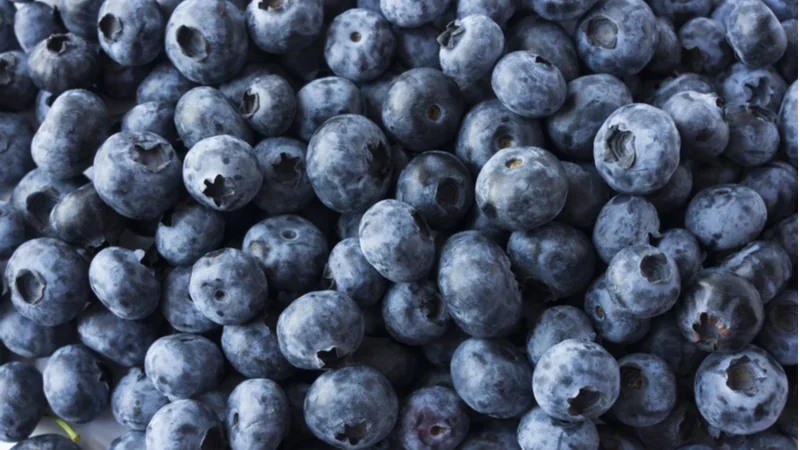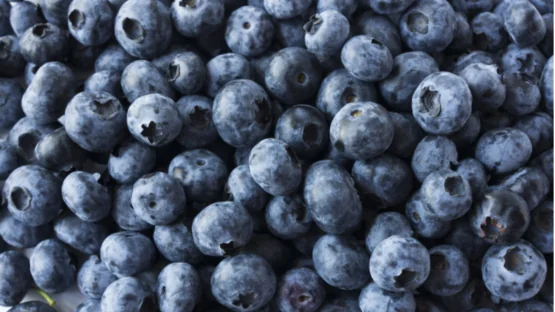A group of researchers has confirmed the neuroprotective effect of blueberry extract and identified a possible mechanism of action that might facilitate drug development [1].
The delicious cure?
Blueberries have long been on the list of “superfoods” that supposedly protect our health and maybe help us live a bit longer. Flavonoids, a class of plant-derived molecules, are probably responsible for many of blueberries’ protective qualities. We covered one of those flavonoids, pterostilbene, in a previous article.
Anthocyanins, one of the subtypes of flavonoids, are natural pigments that give many plants their purple, red, or black colors. Purple cauliflower, for example, owes its stunning appearance to anthocyanins, and blueberries have even more of these compounds. Various gut enzymes metabolize protocatechuic acid (PCA) from anthocyanins, and it has been credited with antioxidant and anti-inflammatory activity [2].
Can humble blueberries help cure Alzheimer’s disease (AD)? Anthocyanins will never become a magic pill for AD, but they have shown some neuroprotective qualities, including in older adults [3]. However, the problem with anthocyanins is that they are not well absorbed by the body: one study found that only a small fraction of anthocyanins is absorbed into plasma [4]. The researchers behind this new study hoped to demonstrate that the actual neuroprotective work is done by PCA, which is absorbed much more readily.
When the garbage chute stops working
The mechanics of AD aren’t perfectly clear and are hotly debated, but we know that it is closely linked to, if not directly caused by, the accumulation of two proteins: amyloid ß and tau, with the first forming amyloid plaques, and the second forming so-called tau-tangles. Normally, harmful proteins are disposed of by autophagy, the process by which misfolded proteins, dysfunctional organelles, and other cellular junk are enclosed in organelles called autophagosomes, transported to other organelles called lysosomes, and then broken down and recycled.
Recent evidence shows that the dysregulation of this autophagy-lysosome pathway precedes the formation of amyloid plaques and tau-tangles. Researchers have also found an increased presence of autophagosomes in AD-stricken neurons [5], which probably means that the function of lysosomes is impaired and they stop accepting material from autophagosomes, leading to the accumulation of those “cellular garbage trucks”.
Anthocyanins, on the other hand, have been shown to promote autophagy. They also improve cognitive function in aged rats. However, until now, it was not entirely clear whether blueberries owed their neuroprotective effect to anthocyanins. The objectives of the study were to verify yet again the neuroprotective effects of blueberry extract (BBE) and their link to autophagy as well as to confirm that these effects are, at least in large part, mediated by PCA.
PCA is what matters
The researchers experimented in vivo with genetically modified mice that overexpress amyloid precursor protein (APP). These mice are routinely used as a murine model of AD. In these experiments, the scientists confirmed that BBE treatment reduced neuron damage by promoting autophagy. There were fewer dead neurons, neuronal morphology was restored, and autophagy markers were upregulated.
In subsequent in vitro experiments, PCA treatment reduced cytotoxicity caused by amyloid ß in hippocampal neurons. At high concentrations, PCA restored cell viability almost to a normal level after it had dropped some 40% following amyloid ß administration. The researchers also found that amyloid ß inhibits the autophagy-lysosomal pathway in neurons, while PCA treatment alleviated that effect. The researchers concluded that PCA is largely responsible for BBE’s neuroprotective qualities and that PCA can be used as a new foundation for anti-AD drugs.
Conclusion
Though eating blueberries seems to have some neuroprotective effects, this is probably not enough to cure Alzheimer’s, for various reasons, including the low levels of absorption of anthocyanins by the body. This study identifies PCA, a seemingly better agent, as a molecule that is largely responsible for BBE’s neuroprotective effects.
These findings can lead to the development of new anti-Alzheimer’s drugs, which would be most welcome considering the current lack of effective treatments. The research also highlights the role of autophagy in AD, which means that AD can potentially be targeted by other drugs that increase autophagy, such as rapamycin and its analogs.
Literature
[1] Li, H., Zheng, T., Lian, F., Xu, T., Yin, W., & Jiang, Y. (2021). Anthocyanin-rich Blueberry Extracts and Anthocyanin Metabolite Protocatechuic Acid promote Autophagy-lysosomal Pathway and alleviate Neurons Damage in vivo and in vitro Models of Alzheimer’s Disease. Nutrition, 111473.
[2] Choi, J. R., Kim, J. H., Lee, S., Cho, E. J., & Kim, H. Y. (2020). Protective effects of protocatechuic acid against cognitive impairment in an amyloid beta-induced Alzheimer’s disease mouse model. Food and Chemical Toxicology, 144, 111571.
[3] Krikorian, R., Shidler, M. D., Nash, T. A., Kalt, W., Vinqvist-Tymchuk, M. R., Shukitt-Hale, B., & Joseph, J. A. (2010). Blueberry supplementation improves memory in older adults. Journal of agricultural and food chemistry, 58(7), 3996-4000.
[4] Vitaglione, P., Donnarumma, G., Napolitano, A., Galvano, F., Gallo, A., Scalfi, L., & Fogliano, V. (2007). Protocatechuic acid is the major human metabolite of cyanidin-glucosides. The Journal of nutrition, 137(9), 2043-2048.
[5] Nixon, R. A., Wegiel, J., Kumar, A., Yu, W. H., Peterhoff, C., Cataldo, A., & Cuervo, A. M. (2005). Extensive involvement of autophagy in Alzheimer disease: an immuno-electron microscopy study. Journal of Neuropathology & Experimental Neurology, 64(2), 113-122.




